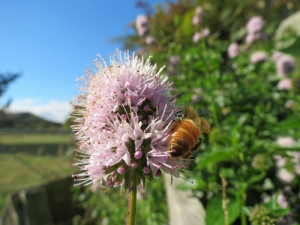Science system shakeup ‘to maximise investment value’
Reaction to the Government’s major overhaul of the country’s seven crown research organisations has so far been largely positive.
 Plant & Food Research is asking growers and beekeepers to share their current practices and their thoughts on future pollination requirements.
Plant & Food Research is asking growers and beekeepers to share their current practices and their thoughts on future pollination requirements.
Plant & Food Research is asking growers and beekeepers to share their current practices and their thoughts on future pollination requirements.
The organisation wants to better understand current use of pollination across the horticultural and agricultural sectors and help design research projects that address industry trends and needs.
"New research into pollination relies on having a full picture of how growers and beekeepers are using bees and other methods for pollinating crops, as well as what they feel are the major issues that need addressing in the future," says Dr David Pattemore.
"Current research tends to be based on overseas findings and anecdotal evidence, but there is little scientific evidence to allow scientists to develop research programmes designed to fill gaps in knowledge or directly address issues identified by growers and apiarists as fundamental to their needs."
Growers, farmers and beekeepers from across Australia and New Zealand are asked to fill in the online questionnaire at www.pollinationsurvey.com
"We know that pollination services are becoming more expensive due to the effort required to manage beehives in the wake of diseases such as varroa and colony collapse disorder, and that growers employ a variety of methods that may promote pollination by wild bees and other insects," says Dr Brad Howlett.
"By understanding what methods are currently employed in different crops and regions, we will have a better understanding of how pollination is used now, the barriers for ensuring optimal pollination, and how we can best tailor our research programme to make sure growers, and apiarists, are getting what they need to sustain their businesses."
The pollination survey is part of the European Union's SUPER-B programme and is administered, under strict confidentiality, by the University of Reading in the UK, with additional funding in New Zealand from the Ministry of Business, Innovation & Employment. SUPER-B is bringing together scientific and societal communities from more than 30 countries across Europe and the globe to develop conservation strategies for crop pollinators.
Mating wrapped up last month at the across-breed Beef Progeny Test on Pāmu’s Kepler Farm in Manapouri.
Libby Judson is a keeper of memories from an age gone by. Tim Fulton tells her story.
A New Zealand-first native tree study has highlighted the Bioeconomy Science Institute's position as a forestry research leader.
Hemp fibre processor Rubisco is relocating its core processing facility to Ashburton as part of a $20-$30 million expansion to leverage what it says is an accelerating global demand for sustainable and renewable fibres.
Tradition meets some of the latest in technology at the 2026 East Coast Farming Expo.
Dairy prices have jumped in the overnight Global Dairy Trade (GDT) auction, breaking a five-month negative streak.

OPINION: If the hand-wringing, cravat and bow-tie wearing commentariat of a left-leaning persuasion had any influence on global markets, we'd…
OPINION: With Winston Peters playing politics with the PM's Indian FTA, all eyes will be on Labour who have the…